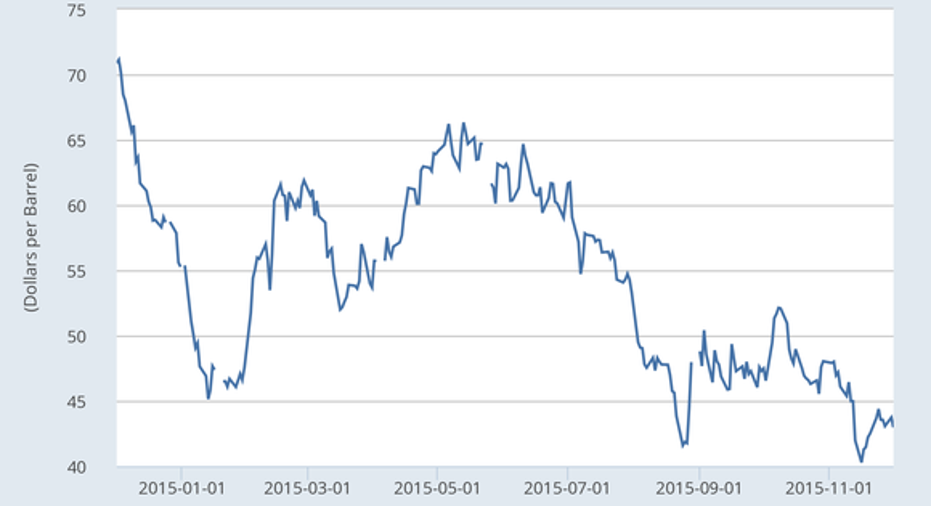ExxonMobil Drops and Keurig Soars as Stocks Fall

Stocks fell as plunging oil prices put pressure on shares of energy companies today. The S&P 500 lost 0.7%, and the Dow Jones Industrial Average ended lower by 0.65%:
ExxonMobil was one of the hardest hit blue-chip stocks on a day when crude oil prices slipped to below $40 per barrel -- from $70 a year ago. Above average winter temperatures are forecast to pinch energy demand and a decision by the Organization of the Petroleum Exporting Countries, to maintain production volume at record high levels, ensures more than enough supply to go around. Those two trends combined to send crude oil futures down nearly 6% today.
Meanwhile, Keurig Green Mountain jumped 72% higher as its management agreed to take the company private.
ExxonMobil's commodity price crunch Exxon's stock fell 3% today, enough to make it the largest percentage-point loser in the Dow. The energy giant's shares are now down 17%, year-to-date.
Lower crude oil prices have a direct, negative impact on Exxon's business. That point was made in dramatic fashion last quarter when the company, despite managing solid sales volumes, posted a 47% profit drop: Earnings plunged to $4.2 billion from $8 billion a year ago.
There's no mystery about the key factor behind that epic shortfall. "Sharply lower commodity prices reduced earnings by $5.1 billion," management explained in an October conference call with investors. Worse yet, crude oil prices were at $50 per barrel at that time, compared to below $40 per barrel today.
Crude oil prices over the last year. Source: Federal Reserve Economic Data.
Still, Exxon's strong cash flow, relative to peers, is a major reason why investors choose to own shares of this dividend aristocrat. That financial strength has held up even during times of declining earnings. Last quarter Exxon returned nearly $4 billion to shareholders through stock buybacks and a steadily climbing dividend payout. "We maintain a relentless focus on business fundamentals, including cost management, regardless of commodity prices," CEO Rex Tillerson said in October. Investors can expect that focus to continue even as oil prices fall to multi-year lows.
Green Mountain's bitter sweet buyout Keurig Green Mountain notched a 70% gain after the home beverage machine maker today announced it is being taken private at a total price of $13.9 billion, or $92 per share. The deal marks a 78% premium over the stock's Friday closing price. "This transaction will deliver significant cash value for our shareholders and offers an exciting new chapter for our customers, partners and employees," CEO Brian Kelley said in a press release.
Source: Keurig
Yet many shareholders aren't likely to be excited about this deal. After all, Keurig was above the $92 level as recently as May, and hit a high of $152 per share less than a year ago.
Sure, a lot has changed for Keurig's business since last November. Most recently, the company posted a 20% drop in machine sales volumes as profits fell 15% to $0.14 per share. Management highlighted progress at cutting costs in the third quarter, which allowed Keurig to boost its dividend. But it also warned that 2016 would be a difficult year as it works to build demand for its just-released KOLD machine.
The company's board of directors decided that Keurig would be better off navigating those challenges as a private entity. The deal is scheduled to close sometime in the first quarter of 2016.
The article ExxonMobil Drops and Keurig Soars as Stocks Fall originally appeared on Fool.com.
Demitrios Kalogeropoulos has no position in any stocks mentioned. The Motley Fool owns shares of ExxonMobil. The Motley Fool recommends Keurig Green Mountain. Try any of our Foolish newsletter services free for 30 days. We Fools may not all hold the same opinions, but we all believe that considering a diverse range of insights makes us better investors. The Motley Fool has a disclosure policy.
Copyright 1995 - 2015 The Motley Fool, LLC. All rights reserved. The Motley Fool has a disclosure policy.



















